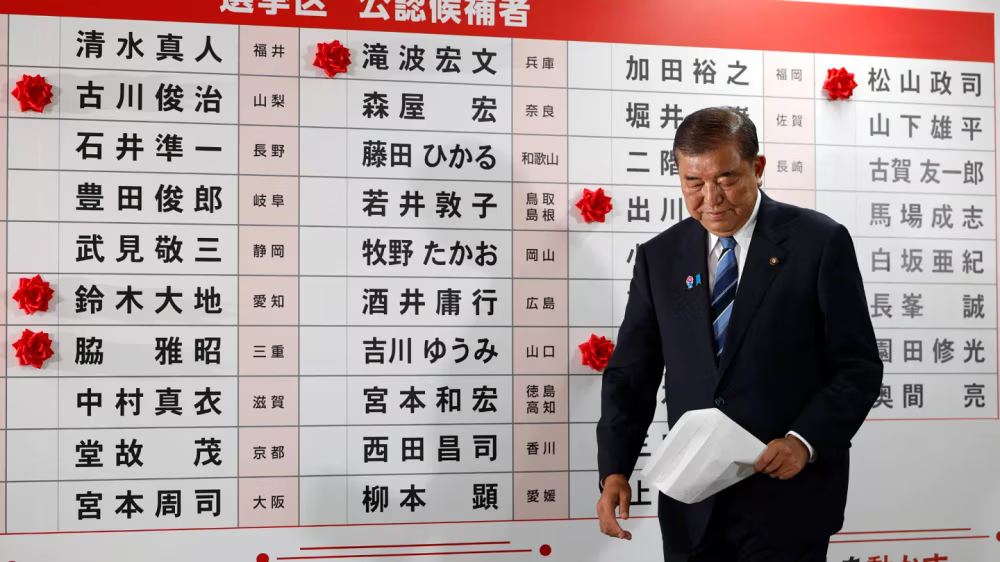Japan’s ruling coalition of the Liberal Democratic Party (LDP) and its junior partner Komeito has lost its majority in the country’s upper house, marking a significant political blow for Prime Minister Shigeru Ishiba. The result of Sunday’s tightly contested vote has deepened uncertainty around the future direction of Japan’s leadership.
Despite the loss, Ishiba has said he has no intention of resigning. “I solemnly accept the harsh result,” the prime minister said after polls closed on Sunday, adding that his focus remains on “trade negotiations.”
Voter Discontent Over Rising Prices, Tariffs
The election took place amid growing public frustration over rising living costs, particularly food prices, and concerns over the looming threat of US-imposed tariffs. The ruling coalition needed 50 seats to maintain control of the 248-seat upper chamber, but secured only 47.
The opposition Constitutional Democratic Party came in second with 22 seats. Only half of the seats were up for election this year, with members serving six-year terms.
Right-Wing Surge Erodes Conservative Base
Analysts suggest that the loss reflects deeper dissatisfaction within the conservative voter base. “Prime Minister Ishiba is considered not conservative enough by many supporters of the former Prime Minister [Shinzo] Abe,” said Jeffrey Hall, a lecturer in Japanese Studies at Kanda University of International Studies.
“They think that he just doesn’t have the nationalistic views on history, he doesn’t have the strong views against China that Abe had,” Hall explained.
Sanseito Party Gains Ground With Nationalist Messaging
Much of the LDP’s lost support appears to have gone to the small but vocal right-wing Sanseito party, which increased its presence dramatically, winning 14 seats — up from just one in the last election.
Hall noted that members of Sanseito are now poised to express views that “haven’t been said in public before by members of the upper house,” citing the party’s embrace of “conspiracy theories, anti-foreign statements, [and] very strong revisionist views about history.”
Sanseito, led by Sohei Kamiya, rose to prominence during the COVID-19 pandemic by sharing conspiracy theories on YouTube, discouraging mask use and vaccinations, and promoting what it calls a “Japanese First” policy.
Public Discontent and Political Scandals Weigh on Ishiba
The result highlights widespread dissatisfaction with Ishiba’s leadership amid an economic slowdown, persistent inflation, and multiple political scandals that have marred the LDP’s image. The price of rice, in particular, has become a flashpoint for voter anger.
Historically, the loss of an upper house majority has proven fatal for sitting prime ministers. The last three LDP leaders who experienced such a defeat stepped down within two months. Analysts had predicted a similar outcome should the coalition perform poorly.
Possible Contenders Eyeing Leadership Challenge
If Ishiba steps aside, several prominent LDP figures may contend for the leadership. These include Sanae Takaichi, who was runner-up to Ishiba in last year’s leadership race; Takayuki Kobayashi, a former economic security minister; and Shinjiro Koizumi, the son of former Prime Minister Junichiro Koizumi.
Any leadership transition would likely bring political turbulence and could complicate critical US-Japan trade negotiations now underway.
Public Sentiment on Immigration A Flashpoint
Sanseito’s rise comes amid growing debate about foreign residents and immigration in Japan — a historically homogeneous nation that has recently seen a record increase in both tourists and long-term foreign residents. That influx has contributed to price inflation and, in some quarters, resentment.
In response, Ishiba last week launched a task force to tackle “crimes or nuisance behaviours committed by some foreign nationals,” with a focus on immigration, land acquisitions, and unpaid social insurance — an apparent attempt to address voter concerns on the issue.
Markets Unshaken by Expected Outcome
Despite the political drama, financial markets appeared largely unshaken. The Tokyo Stock Exchange was closed for a public holiday on Monday, but the yen strengthened against major global currencies, suggesting investors had anticipated the election result.






